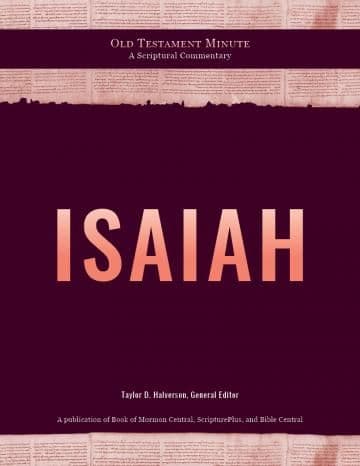Book
34 Chapters

There’s no chapter break between 15 and 16. Chapter 16 is a continuation of 15.
16:1. Sela, meaning “rock,” may be a place-name in Edom associated with Petra (also meaning “rock”), later the capital of the Nabateans. See NRSV translation for verses 1–2. In the NIV, it reads, “Send lambs as tribute to the ruler of the land.” Isaiah likely describes directions from the defeated rulers of Moab, given to their envoys, and sent to Judah, offering tribute to them and requesting help from the Moabite refugees. Tribute is payment by one nation for protection of another; an alliance of sorts.
16:2. This verse describes the women of Moab as they try to find refuge by crossing the River Arnon into Judah.
16:3. Direct command is given to “hide the fugitives. Do not betray the refugees.” And in verse 4, “Let the Moabite refugees stay with you. Be their shelter from the destroyer.” See NRSV translation for verses 3–4. Moab seeks refuge from Judah.
16:5. This prophecy, embodying the Moabite hope for refuge in Judah, also appears to describe Judah’s hope in a future Davidic leader. A man will sit on the throne in love and righteousness from the house of David, judging with justice and righteousness.
16:6–13. Verse 6 assesses the refugees of Moab, using the word “pride” three times in one sentence, but now, in verses 7–9, they “lament and grieve” for the grapevines for which this area was famous. “The fields of Heshbon wither, the vines of Sibmah also. The rulers of the nations have trampled down the choicest vines, . . . so I weep as Jazer weeps for the vines of Sibmah. Oh Heshbon, oh Elealeh. I drench you with tears. The shouts of joy over your ripened fruit and over your harvest have been stilled” (verse 10). “No one sings or shouts in the vineyards . . . no one treads out wine at the presses, for I have put an end to the shouting.” And then again in verse 13, “my heart laments for Moab like a harp. My inmost being for Kir-haresh.”
16:13–14. These verses explain that “within three years, as an indentured servant bound by contract would count them” Moab will be despised, and her survivors will be very few and feeble. People paid off their debts by working off what they owed, so an indentured servant would carefully count the days. When the last day is paid, they’re free again.
Book
34 Chapters
Items in the BMC Archive are made publicly available for non-commercial, private use. Inclusion within the BMC Archive does not imply endorsement. Items do not represent the official views of The Church of Jesus Christ of Latter-day Saints or of Book of Mormon Central.